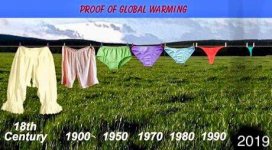You are using an out of date browser. It may not display this or other websites correctly.
You should upgrade or use an alternative browser.
You should upgrade or use an alternative browser.
Warning signs of Gulfstream collapse
- Thread starter bear66
- Start date
Laughing
Well-known member
Who is playing me in the movie?"Age of Stupid". A very good film.
Laughing
Well-known member
Ewan mcgregor nice one.Some Scottish fella.
Expat Smoggie
Well-known member
to get all the governments, humanity on board with such a concept will take an eternity. Plus who will pay for it?Hypothetically, even if 1% of change is directly linked to human behaviour (for the record I believe it's much more) - wouldn't you want to act to try influence what you can? Ultimately it's the continued existence of the human race which is at stake here.
It may all be futile eventually, but I'm not sure this falls into the "too hard/can't be bothered" basket.
bear66
Well-known member
Not using energy saves money.to get all the governments, humanity on board with such a concept will take an eternity. Plus who will pay for it?
I saw those graphs too. I also read a list of 140 greenhouse gas emitters, from Mankind (and its influence) to oceans, bogs, forests, deserts, tundra and all manner of other things that emit traces of greenhouse gases. If the increase in greenhouse gases is 100 parts per million since 1500 - which those graphs indicate - then why is the climate changing so fast on the basis of a 0.0001% increase?Look at data on the CO2 levels in the atmosphere compared with the last 800,000 years. We're at levels now that you'd have to go back 3 million years. And this is just atmospheric CO2 levels!
View attachment 22419
Atmospheric CO2 levels
View attachment 22420
I've seen loads of math models that mention avalanche effect and other similar terms, but I'm not a Math graduate so I have no idea whether they are correct or not.
And the challenge is not going to be convincing people that global warming is a threat, it's going to be convincing people that a 0.0001% increase in greenhouse gases is what's causing it. I reckon most people reckon that the atmosphere is already rich in in CO2, so it's going to be a bit of a shock when they find out it's only 0.04% of the atmosphere.
And nobody seems to wonder why the level of oxygen in the atmosphere has fallen by .7% in less than a million years - which is a far greater change when oxygen accounts for about 20% of the atmosphere - and what effect this could be having. Correlation is not causation.
bear66
Well-known member
There are lots of research papers on the falling oxygen levels (which may be 0.7% or may not be) and no hypotheses link this to CO2 levels.I saw those graphs too. I also read a list of 140 greenhouse gas emitters, from Mankind (and its influence) to oceans, bogs, forests, deserts, tundra and all manner of other things that emit traces of greenhouse gases. If the increase in greenhouse gases is 100 parts per million since 1500 - which those graphs indicate - then why is the climate changing so fast on the basis of a 0.0001% increase?
I've seen loads of math models that mention avalanche effect and other similar terms, but I'm not a Math graduate so I have no idea whether they are correct or not.
And the challenge is not going to be convincing people that global warming is a threat, it's going to be convincing people that a 0.0001% increase in greenhouse gases is what's causing it. I reckon most people reckon that the atmosphere is already rich in in CO2, so it's going to be a bit of a shock when they find out it's only 0.04% of the atmosphere.
And nobody seems to wonder why the level of oxygen in the atmosphere has fallen by .7% in less than a million years - which is a far greater change when oxygen accounts for about 20% of the atmosphere - and what effect this could be having. Correlation is not causation.
So lots of people are wondering about a lot of things, but the vast majority of scientists understand the effect of greenhouse gases.
The increases from 1500 are methane; CO2 increases came later.
There are a lot of papers relating to population increases causing the earlier rise in methane levels. One here
bear66
Well-known member
It's the image of Branson, Bezos and Musk collecting fares off 8 billion people as the set off for some far distant galaxy six at a time.Is that inaccurate hairy one? I thought it was a well presented argument done from my, admittedly, poor memory.
Go on then whats wrong with it, go on, go on.... Hah gotcha.
Laughing
Well-known member
We'll be OK.. Bus passess!It's the image of Branson, Bezos and Musk collecting fares off 8 billion people as the set off for some far distant galaxy six at a time.
SmallTown
Well-known member
Poor Africa. That map looks rough for them. Ironic that Norway are one of the leading nations in certain aspects of environmental stuff such as renewable energy and EV use. Yet they have the least to lose from climate change. Suckers!No. Everywhere will be affected negatively, but some countries will be in a better position to survive. Norway at No 1 in that respect.
Link

